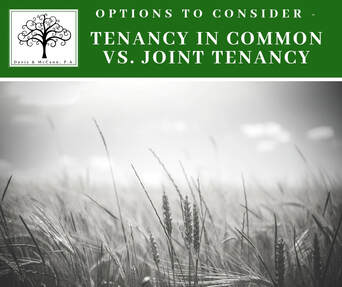 Q: What happens when you own property with someone and the co-owner dies? A: The answer depends on how the property is titled. For Kansas residents, here’s the short and sweet version of how property will transfer if a co-owner dies: Tenancy in Common: If the owners are “tenants in common”, the deceased owner’s interest will transfer according to his/her estate plan, or intestacy laws should he/she fail to make a plan. The surviving owner(s) will not obtain the decedent’s interest unless they receive it under his/her estate. The surviving owner will continue to own the same percentage of property, but they may end up sharing the property ownership with a new co-owner(s) after the decedent’s estate is settled. Joint Tenancy: If the property is owned as “joint tenants with rights of survivorship and not as tenants in common” and one of the owners dies, the deceased person's interest transfers to the surviving joint tenant. For the surviving owner to obtain clear title, her/she must file an original death certificate of the decedent with the Register of Deeds in the county where the property is located. The surviving owner will then have sole authority over the sale and/or transfer of the property in the future. If the title doesn’t indicate whether the owners are joint tenants or tenants in common, the presumption is that the owners are tenants in common. In order for a property to be owned in joint tenancy, the joint tenancy language must be included on the deed. Should spouses hold property as tenants in common or as joint tenants? That’s a question best answered with your estate planning attorney. In some instances, a property held as tenants in common can be advantageous to the surviving spouse. In other circumstances, the joint tenancy will clearly be the most economical and easiest way to transfer the property to the surviving spouse. Which method of tenancy would be recommended depends on your answer to several questions, such as: • What is the current value of your estate? • Is it your desire to save your surviving spouse from unnecessary taxation upon your death? • Are you concerned with protecting the privacy of your asset holdings upon your death? • Are you concerned about your surviving spouse remarrying after your death and not leaving the property to your children? • What type of estate plan do you currently have in place and does it still reflect your wishes for distribution of your assets? • Is it your intention that your surviving spouse have the ability to sell or transfer the property as he/she may desire, after your death? Or, do you want to have some control over who receives the property after your surviving spouse’s death? The best way to determine which tenancy method should be used, is to fully disclose your assets and distribution goals to an experienced estate planning attorney. Your attorney can then provide you with the available options so that you can make an educated decision on what is best for you. For more information about this topic and other real estate matters, contact Davis & McCann, P. A., Dodge City, KS. We are members of Wealth Counsel, a national consortium of Estate Planning Attorneys and focus our practice on providing clients with the best legal advice on estate planning, Medicaid and Long-term Care Planning, Business Formation, Agri-Business/Small Business Succession Planning, Probate, Trust Administration, Real Estate Transactions, and related matters. Comments are closed.
|
NEWS YOU CAN USEDavis & McCann, P. A., Archives
April 2021
Categories
All
|

 RSS Feed
RSS Feed